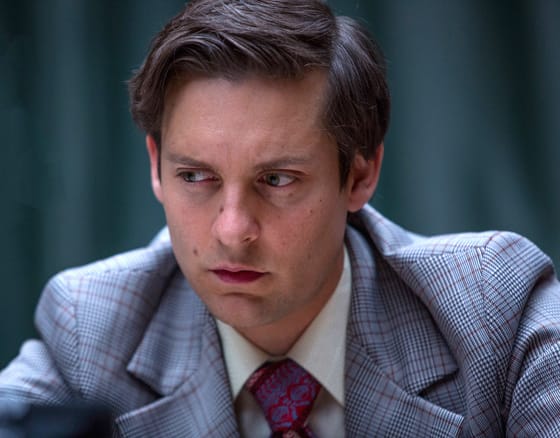Edward Zwick's biopic about the renowned American World Chess Champion Bobby Fischer, Pawn Sacrifice, is a standard, serviceable true story that flirts with overriding themes more than it embraces them. It's brisk and oft-expository, rushing through the fundamentals of his childhood and teen years, addressing generalized character traits and key life moments, before reaching its destination: the World Chess Championship battle between Fischer and Boris Spassky, the reigning U.S.S.R. champ.
Before reaching its climax and the clear fulcrum of the narrative, Fischer's (Tobey Maguire) disposition is a tad mercurial and socially abject. There's a dialogue about his resentment towards his mother's (Robin Weigert) Communist leanings and a rather broad detailing of his relationship with chess coach Bill Lombardy (Peter Sarsgaard) filled with constant referrals to the Cold War and the Soviet monopoly on chess titles. Save Fischer's idiosyncrasies — an awkward sexual advance from a young woman (Evelyne Brochu) outlines his singled-minded pursuit of chess supremacy — and occasionally fractured grasp on reality, Pawn Sacrifice is surprisingly flat and devoid of personality, having only a washed out colour scheme and some authentic vintage set and costume design to stimulate the senses.
There are a few reasons for this. The biggest issue with trying to make a biopic about a figure like Bobby Fischer is trying to condense his life into a single feature narrative while inserting bigger themes and trajectories to satisfy the needs of basic storytelling. He's a complicated and problematic figure that was known for uttering anti-Semitic sentiments and ignoring government embargos, which Zwick acknowledges in the periphery but mostly ignores in order to paint Fischer as a victim of Cold War politics (hence the title).
There's also a strange indifference towards chess. Obviously, the game is used as a metaphor for the ongoing conflict between the U.S. and the U.S.S.R., but Fischer's obsession with it and the strategies involved in it aren't exploited for stylistic or thematic benefit. Zwick shows the game being played, but doesn't really interpret it beyond this.
What does work about this psychological drama is the eventual battle between Fischer and Spassky (Liev Schreiber) and the unflattering but subtle way that Maguire handles the balance between sober focus and intruding madness. By the time 1972 comes around, Fischer is at his most unstable; his paranoia and belief that the government is monitoring his actions and phone calls lead to an abundance of irrational decisions and unwarranted outbursts, particularly against the Russians. It's these sequences, and the overall sense that both Spassky and Fischer are just puppets being left out of the bigger dialogue about their chess game, that gives Pawn Sacrifice some tension and emotional heft.
Presumably, if Zwick used this match as a framing device for the rest of the film, injecting the otherwise glossed-over factoids at key emotional moments to add some context, the visceral component could have been elevated, resulting in greater audience investment. But, since things are presented in a linear fashion and then summarized with some end title cards — that again ignore some of the more contentious aspects of Fischer's life — there's a formal coldness about it all that leaves a feeling of indifference lingering here.
(Elevation Pictures)Before reaching its climax and the clear fulcrum of the narrative, Fischer's (Tobey Maguire) disposition is a tad mercurial and socially abject. There's a dialogue about his resentment towards his mother's (Robin Weigert) Communist leanings and a rather broad detailing of his relationship with chess coach Bill Lombardy (Peter Sarsgaard) filled with constant referrals to the Cold War and the Soviet monopoly on chess titles. Save Fischer's idiosyncrasies — an awkward sexual advance from a young woman (Evelyne Brochu) outlines his singled-minded pursuit of chess supremacy — and occasionally fractured grasp on reality, Pawn Sacrifice is surprisingly flat and devoid of personality, having only a washed out colour scheme and some authentic vintage set and costume design to stimulate the senses.
There are a few reasons for this. The biggest issue with trying to make a biopic about a figure like Bobby Fischer is trying to condense his life into a single feature narrative while inserting bigger themes and trajectories to satisfy the needs of basic storytelling. He's a complicated and problematic figure that was known for uttering anti-Semitic sentiments and ignoring government embargos, which Zwick acknowledges in the periphery but mostly ignores in order to paint Fischer as a victim of Cold War politics (hence the title).
There's also a strange indifference towards chess. Obviously, the game is used as a metaphor for the ongoing conflict between the U.S. and the U.S.S.R., but Fischer's obsession with it and the strategies involved in it aren't exploited for stylistic or thematic benefit. Zwick shows the game being played, but doesn't really interpret it beyond this.
What does work about this psychological drama is the eventual battle between Fischer and Spassky (Liev Schreiber) and the unflattering but subtle way that Maguire handles the balance between sober focus and intruding madness. By the time 1972 comes around, Fischer is at his most unstable; his paranoia and belief that the government is monitoring his actions and phone calls lead to an abundance of irrational decisions and unwarranted outbursts, particularly against the Russians. It's these sequences, and the overall sense that both Spassky and Fischer are just puppets being left out of the bigger dialogue about their chess game, that gives Pawn Sacrifice some tension and emotional heft.
Presumably, if Zwick used this match as a framing device for the rest of the film, injecting the otherwise glossed-over factoids at key emotional moments to add some context, the visceral component could have been elevated, resulting in greater audience investment. But, since things are presented in a linear fashion and then summarized with some end title cards — that again ignore some of the more contentious aspects of Fischer's life — there's a formal coldness about it all that leaves a feeling of indifference lingering here.




